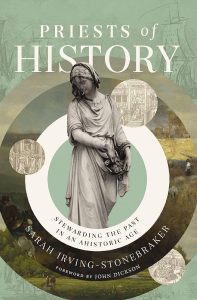October 21, 2024
Priests of History: Dialling Down the Anti-Foundational Hysteria of the Ahistorical

The clang of the hysteria of those who shriek that we should get on “the right side of history” emanates from the hollowness of their argument. As events are now proving, those with the least understanding of history – or who are even hostile to history – are clueless, rootless and lacking in foundations.
In short, the ahistorical are on the wrong side of something that they do not even understand.
Take a look at the building in the picture above. It popped up on social media the other day and I was immediately struck by the depth – literal and metaphorical – of that image. Here was the accompanying description:

Fascinating! A layered past! Yet if you did not dig down below that top building you would not assume that the other buildings – all holding it up, all built upon having served their time – ever existed.
Yet there they are! In plain sight. In plain site 🙂
The strength of Sarah Irving-Stonebraker’s new book: Priests of History: Stewarding the Past In An Ahistoric Age, is its deftness at uncovering the past upon which so much modern assumption is built upon. Or more the case a set of modern assumptions. Assumptions that, well, that assume, they sprang up from thin air. Or, as in the case of our metaphor, rose from the ground without foundation.
Loud, proud, snarky, vicious, and with the complete confidence that it can build a cultural edifice sans anything or anyone else except the will to power.
Associate Professor Irving-Stonebraker sweeps aside these assumptions with all of the deftness of an archaeological dig, demonstrating time and time again that the current crises we face are predicated upon the ahistorical zeitgeist. But she’s more than a mere conservative, as if conservatism alone is what will help.

No. She convincingly shows that the West’s building has been constructed on a Christian bedrock, and one that has enabled the West to reach the point it has today. And when we throw off Christianity our building is going to totter.
Her image of Christians being the priests of history” is a beautiful one. We are not so much the soldiers of history, or even its guardians, but its priests, who “tend and care” for the past in order for the future to rise into something good, and true and noble.
Irving-Stonebraker states that just as famed Christian scientist Robert Boyle called his peers to be the “priests of nature”, the role of the church and of individual Christians, is to be the “priests of history”, looking after it, protecting it, showing why it matters. And she has strong words for the church in all of this too, for it is not merely the progressive secularist who is the problem.
As you can see from the following quote, we’ve been drinking at a foul fountain:
Are Christians just rootless consumers living in a perpetual present? The loss of the sacred and transcendent character of God is a symptom of just how acculturated we have become to the secular ahistoric worldview: if there is no God all things are ordinary. There is nothing divine and nothing transcendent, and the past is irrelevant.
Which mean, if nothing else (and there is plenty more), that this book is a discipleship project. Christians are living like non-Christians – if not in word, then definitely in imagination. And then some.
And these words are coming from a well-regarded historian who grew up as an atheist, and who – like Peggy Lee in her song “Is That All There Is?” began to wonder if this was it.
For Peggy that was love and sex. For Irving-Stonebraker it was the achievement of Oxford and Cambridge and the career she had always wanted. Sound familiar? Irving-Stonebraker’s personal story is woven into the book, and it’s warm, compelling and enlivening.
I am convinced that, even if we don’t see a wholesale return to Christianity in my age, we are seeing the first signs of a return to the historical truths of Christianity in our ahistorical age. And this book is just one sign of it. It’s the first of a rash of books I am reading, including the up and coming newbie from Rod Dreher: Living in Wonder: Finding Mystery and Meaning in a Secular Age.
Dreher was too crunchy for some in his last two works, which were pushbacks – and good ones at that – against the culture wars. But in this new one, it seems that he too has seen the signs. There is something afoot. Go buy both books now!
Not that it all good. This search for the transcendent. As Ross Douthat in The New York Times warned a few years ago, the search will dredge up some pretty ugly stuff. None uglier, I might add, than the likes of this retweet by the increasingly fraught Australian writer/anti-Semite, Clementine Ford, who tweeted this beauty:

And then to top it all of, found herself with something to say about the historical Jesus after all:

Ford’s is a house without foundation. A house of ill-repute that will one day collapse around her. And it’s easy to get angry with this nonsense, because as is the case with all nonsense, eventually it will become dangerous nonsense.
The response is not to be angry. Well not too angry. But rather to channel our anger into tending and caring for history in the manner of the priests that we are. So that when the foundations of the lives of those around us – and indeed the culture around us- prove incapable of holding them up, we can show then the bulwark of the faith that has been handed down for two thousand years.
Written by
There is no guarantee that Jesus will return in our desired timeframe. Yet we have no reason to be anxious, because even if the timeframe is not guaranteed, the outcome is! We don’t have to waste energy being anxious; we can put it to better use.
Stephen McAlpine – futureproof
Stay in the know
Receive content updates, new blog articles and upcoming events all to your inbox.


